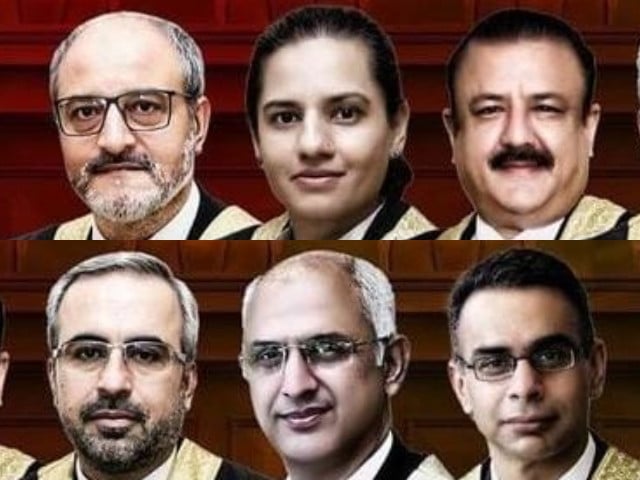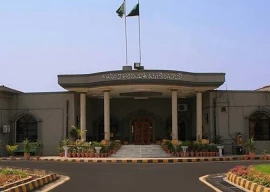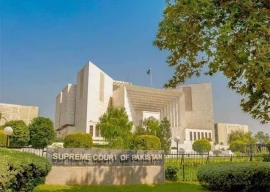
In an unprecedented move, six judges of the Islamabad High Court (IHC) have reached out to the Supreme Judicial Council (SJC) seeking clarity on the alleged intrusion of executive members, including intelligence operatives, in the judicial matters.
Six judges of the IHC—Justice Mohsin Akhtar Kiyani, Justice Tariq Mehmood Jahangiri, Justice Babar Sattar, Justice Sardar Ejaz Ishaq Khan, Justice Arbab Muhammad Tahir and Justice Saman Rafat Imtiaz—have penned a letter to the SJC led by Chief Justice Qazi Faez Isa, expressing concerns about the "interference" of intelligence agencies in the affairs of the courts.
"We, therefore, request that a judicial convention be called to consider the matter of interference of intelligence operatives with judicial functions and/or intimidation of judges in a manner that undermines the independence of the judiciary.”
The open letter, a copy which has been sent to all SC judges, notes that such a convention might provide further information as to whether judges of other high courts have had experiences similar.
“Such institutional consultation might then assist the Supreme Court to consider how best to protect independence of the judiciary, put in place a mechanism to affix liability for those who undermine such independence and clarify for the benefit of individual judges the course of action they must take when they find themselves at the receiving end of interference and/or intimidation by members of the executive.”
The move comes just days after the recent ruling by the apex court, which deemed the removal of former IHC Justice Shaukat Aziz Siddiqui as illegal, decreeing his status as that of a retired judge.
The verdict highlighted the SJC's approach towards Justice Siddiqui's case, indicating that the council had proceeded under the assumption that the veracity of the allegations raised by the former judge was irrelevant.
Furthermore, it pointed out that Justice Siddiqui had purportedly failed to substantiate or independently corroborate the allegations.
In their letter to the SJC, the IHC judges underscored the absence of clear guidelines within the council's prescribed code of conduct for judges regarding the appropriate response to incidents that encroach upon judicial independence.
Justice Syed Mansoor Ali Shah, Justice Munib Akhtar, IHC Chief Justice Aamer Farooq, and Peshawar High Court Chief Justice Muhammad Ibrahim Khan are members of the council.
CJP Isa ‘in the dock’
In the wake of the letter, all eyes are set on SJC, led by CJP Qazi Faez Isa, to see what the next course of action will be regarding the letter.
Salahuddin Ahmed, the former President of the Sindh High Court Bar Association, stresses the critical necessity of the Supreme Court taking suo motu action promptly.
"In Shaukat Siddiqui’s case, on behalf of the Islamabad Bar, I had asked the SC to investigate his allegations regarding intel agencies (either itself or through a Commission). That has now become absolutely imperative", he said.
After the endorsement of the Supreme Court Practice and Procedure Act 2023, a three-judge committee consisting of CJP Qazi Faez Isa, Justice Syed Mansoor Ali Shah, and Justice Munib Akhtar will deliberate on the non-exercise of suo motu jurisdiction in this matter.
Senior lawyers are also questioning why IHC CJ Aamer Farooq did not take decisive action on the letters penned by his fellow judges regarding the interference of intelligence agencies in judicial functions.
Former Senator Mustafa Nawaz Khokhar remarked that the judges of the IHC have put CJP Isa in the dock.
"Their own chief justice apparently having failed them. They seek an institutional response to intimidation and meddling with damning evidence, quoting Justice Siddique as an example. This calls for legal fraternity to stand up for the independence of the judiciary,” Khokhar said.
In their letter, the judges emphasised the necessity of investigating whether there exists an ongoing policy within the executive branch aimed at interfering with judicial affairs.
The letter also called for a judicial convention to deliberate on the issue of intelligence operatives meddling with judicial functions and intimidating judges, thereby undermining the judiciary's independence.
The judges stated, "Such institutional consultation might then assist the Supreme Court to consider how best to protect independence of the judiciary, put in place a mechanism to affix liability for those who undermine such independence and clarify for the benefit of individual judges the course of action they must take when they find themselves at the receiving end of interference and/or intimidation by members of the executive."
"Justice Siddiqui had been removed after he had publicly alleged that operatives of the Inter-Services Intelligence ("ISI"), led by Major General Faiz Hameed (DG-C of ISI), were determining the constitution of benches at IHC and interfering with proceedings of the Accountability Court Islamabad,” the letter read.
"After the SC's judgment, Justice Siddiqui has reiterated his demand in media interviews that allegations of interference by ISI operatives aimed at engineering the outcome of judicial proceedings be investigated.”
"We support Justice Siddiqui's request to investigate the allegations made by him and request that the scope of such investigation be expanded to determine whether such interference in relation to the administrative functions of IHC (including composition of benches and marking of cases) and judicial proceedings of the courts that IHC supervises are still continuing and whether judges of High Courts and District/Special Courts are discharging functions under explicit and/or veiled threats of coercion by intelligence agencies.”
“We will also note that the Code of Conduct for Judges prescribed by SJC provides no guidance on how judges must react to and/or report incidents that are tantamount to intimidation and interfere with judicial independence,” the judges asserted.
"We believe it is imperative to inquire into and determine whether there exists a continuing policy on part of the executive branch of the state, implemented by intelligence operatives who report to the executive branch, to intimidate judges, under threat of coercion or blackmail, to engineer judicial outcomes in politically consequential matters," the judges asserted.


1725612926-0/Tribune-Pic-(8)1725612926-0-165x106.webp)








1725254039-0/Untitled-design-(24)1725254039-0-270x192.webp)








COMMENTS (4)
Comments are moderated and generally will be posted if they are on-topic and not abusive.
For more information, please see our Comments FAQ